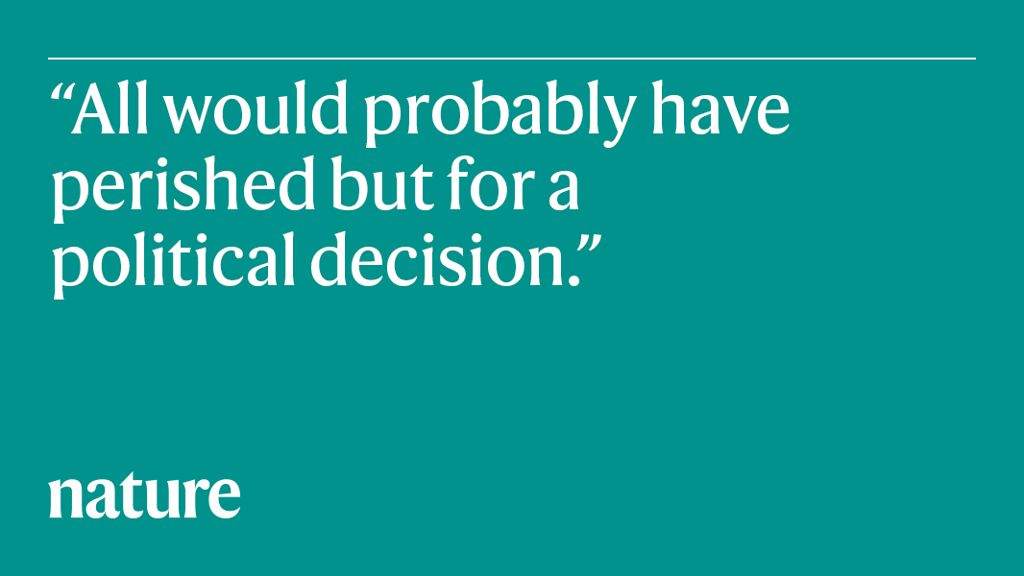When the British House of Commons voted this month not to uphold child refugees’ right to join family members in the United Kingdom, I was reminded of something. As a scientific biographer and obituarist (for Nature and the newspaper The Guardian), I’m regularly struck by how much leading scientific nations have gained from people to whom they once gave sanctuary.
Every life — whether of an adult or a child — is valuable, and people should be saved for humanitarian reasons alone. But it’s worth remembering that the country benefits.
Take three pioneering researchers who all died in December 2019, and all had one other thing in common: they came to Britain in 1938–39 as unaccompanied child refugees from Europe. Hans Kornberg elucidated the reactions that microbes use to exploit carbon sources; Hannah Steinberg identified some of the effects of psychoactive drugs and drug combinations on behaviour; and Leslie Brent recognized a mechanism underpinning immune tolerance.
Current British policy on child refugees is callous. There are perhaps a few hundred such children waiting to join siblings, uncles, aunts or grandparents in the United Kingdom. Most have either lost their parents or left them behind in their war-ravaged countries.
Under European Union law they currently have the right to rejoin their families, but this is set to be revoked now that the Withdrawal Agreement Bill that sets terms for Britain’s relationship with the EU after Brexit on 31 January has passed its final stage. After winning a convincing electoral victory in December, Conservative lawmakers ditched a key amendment guaranteeing the rights of child refugees; an attempt to reinstate it earlier this month failed.
Contrast this with the action of the British government in 1938. In November that year, on what has become known as Kristallnacht, Jewish homes, businesses and synagogues were ransacked across Germany with the connivance of the Nazi government. Days later, the UK House of Commons debated the situation, and the home secretary agreed to admit an unspecified number of Jewish children from Germany and neighbouring countries through a system later known as the Kindertransport. Most of the children travelled by train from Vienna, Berlin or Prague. In the months leading up to the outbreak of war in September 1939, around 10,000 came to the United Kingdom.
Steinberg fled Vienna aged 14, in 1938. She stayed with relatives and then a foster family; her mother took her own life and her father fled to Israel. In Britain, Steinberg was able to study psychology at University College London, where she went on to hold one of the world’s first chairs in psychopharmacology. In retirement, she continued her research, helping to establish an evidence base on the psychological effects of exercise.
Kornberg, later knighted for his services to science, arrived in 1939 from northern Germany. Aged 11, he went to live with an uncle; both his parents died in the Holocaust. On leaving school, he took a job as a technician with Hans Krebs, a Jewish biochemist fired in 1933 by the University of Freiburg, Germany, because of his heritage. Krebs had just discovered the cycle of energy transformation in cells, for which he later won a Nobel prize. Kornberg went on to reach heights of distinction he could not have dreamt of on the cold, crowded train from Berlin, including gaining the chair in biochemistry at the University of Cambridge, UK.
Brent (born Lothar Baruch) was a key contributor to Peter Medawar’s Nobel-prizewinning work on induced immune tolerance. At age 13, Brent was on the first Kindertransport from Berlin. Both his parents were transported to Latvia and shot. He came to the United Kingdom without any family to greet him, and worked as a laboratory assistant before achieving academic success.
Others who endured appalling upheavals in their childhoods and yet thrived after the Kindertransport are still alive, most notably Steve Shirley, who shattered the glass ceiling for women in computing and pioneered home-based programming. Made a dame for services to information technology in 2000, she says: “I determined at a ridiculously young age to make mine a life that had been worth saving.” Others moved to the United States, of whom three — Walter Kohn, Arno Penzias and Jack Steinberger — won Nobel prizes in chemistry or physics. All would probably have perished but for a political decision.
In 1938, Britain had only recently emerged from a recession. It was heading into a war, and national debt remained stubbornly high. Yes, more could have been done, but for child refugees common humanity prevailed. It should do so again, in Britain and beyond. (As an aside: there is abundant evidence that immigration benefits economies, and that people overestimate true levels of migration by orders of magnitude. The argument that wealthy nations must safeguard their economies from becoming ‘overwhelmed’ by ‘uncontrolled’ immigration has no evidence base.)
Without a legal means to access the United Kingdom, children will risk their lives in the unseaworthy craft that are increasingly trying to cross the busy and often wind-tossed English Channel, or stow away in the kind of lorry in which 39 Vietnamese people suffocated in October 2019.
Out of simple human compassion — and in honour of the huge contributions made by refugee researchers — should not scientists speak up for these children?

